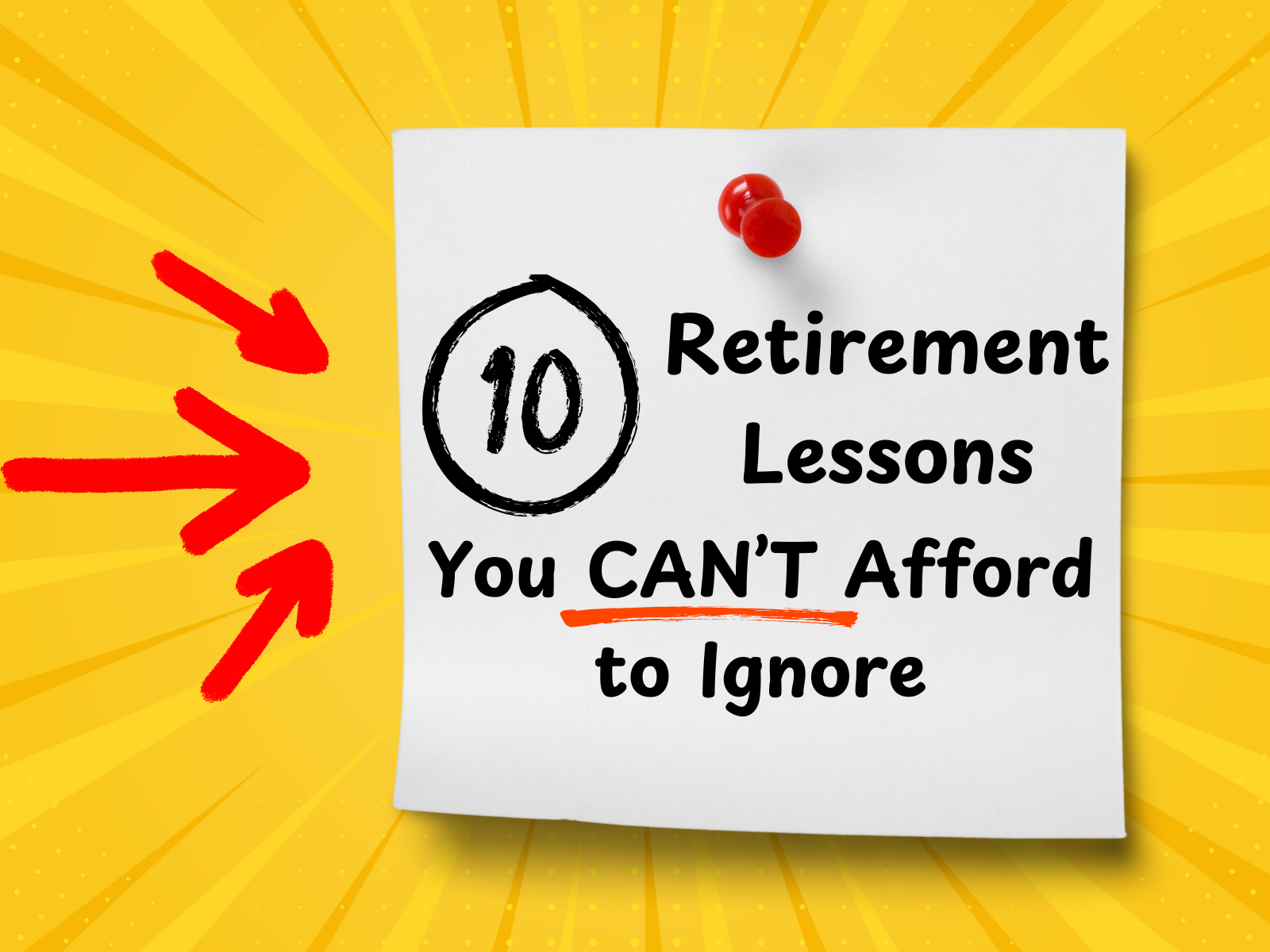10 Retirement Lessons You Can’t Afford to Ignore
If you nail these, you’re on your way to a successful, happy and fulfilling retirement!
Focus on These Key Areas!
For most people, retirement is sort of a mystery.
Many people enter this stage of their life without a clear understanding of what their life will look like and how they’ll be able to retire comfortably and securely.
Here are ten key lessons that can help you build a fulfilling and financially sound retirement:
1. Keep. Things. Simple. Where. Possible.
Simple is usually better.
Retirement planning doesn’t have to be overly complicated. If fact, it probably shouldn’t be. The more complex your finances, the more difficult it becomes to manage everything effectively.
Simplify by:
Consolidating accounts – Too many retirement accounts can be hard to track.
Using low-cost index funds or ETFs – These provide diversified, tax-efficient investing.
Automating bill payments and investment withdrawals – This ensures you don’t miss payments or make emotional investment decisions.
Working with a trusted financial planner – A fee-only fiduciary financial planner can help you manage everything effectively and ensure you have your blind spots covered, while acting in your best interest.
2. Retirement is WAY MORE Than Just About Money
A fulfilling retirement isn’t just about money—in fact, if you’re doing it right you probably aren’t thinking much about your money because things are on autopilot and working well.
I’ve found from my clients that living a great retirement involves staying engaged, maintaining social connections, and having a sense of purpose.
Many retirees struggle with isolation after leaving the workforce, which can negatively impact both mental and physical health.
One of the best ways to combat this is by finding communities of like-minded retirees who share your interests and values. These groups can offer social events, volunteer opportunities, and support networks that help you stay active and engaged.
For example, if you live in the Vancouver, WA area, you might check out RetireRidgefield—a local group of retirees dedicated to helping retirees connect, find activities, and engage with their community.
Other ways to stay socially and intellectually connected include:
Joining local clubs or hobby groups (hiking, book clubs, art classes, etc.).
Volunteering with charities, mentoring programs, or local non-profits.
Taking classes at a local community college to keep learning and meet new people.
Staying involved in faith or civic organizations.
Exploring part-time work or consulting to remain professionally active on your terms.
Retirement is an opportunity to design the life you want, and building strong social connections plays a crucial role in long-term happiness and well-being.
3. You Need to Map Out Your Income Need in Retirement
During your working years, a paycheck from your employer provided you the means to live a comfortable life.
However, in retirement, you need to replace that paycheck with sustainable withdrawals, pensions, Social Security, and other income sources.
Without a clear plan for this, you risk depleting your savings too quickly or spending inefficiently.
Key strategies:
Understand your withdrawal strategy – The 4% rule (withdrawing 4% of your portfolio annually) is a commonly referred to starting point, but this isn’t the right strategy for most and can cause you to underspend (most often) or overspend in retirement.
Optimize Social Security benefits – Delaying benefits to age 70 can increase monthly payments by up to 8% per year.
Diversify your income sources – Having other sources of income like rental income, part-time work, etc. can help to supplement portfolio withdrawals and lessen the burden on your accounts.
Plan for rising costs – Inflation doesn’t stop.. The last few years, inflation was very high. Long-term inflation typically runs at 2.5%-3%. Make sure that you’re planning for your retirement spend to increase at this rate every year. Adjust your withdrawal strategy accordingly.
4. Build Wealth That Lasts!
Saving for retirement is just the beginning—managing wealth wisely so it lasts 30+ years is the real challenge.
Many retirees fear outliving their savings, but planning for the right things can help to significantly mitigate this risk.
Key strategies:
Maintain a balanced investment portfolio – Even in retirement, some stock exposure is necessary for growing your portfolio enough to keep up with inflation and fulfill your desired retirement objectives.
Create a cash reserve – Holding 1-2 years’ worth of living expenses in cash can prevent you from selling stocks investments at a loss during downturns and provide you a short-term buffer.
Use tax-efficient withdrawal strategies – Tapping Roth IRAs, taxable accounts, and traditional IRAs in the right order can lower your tax bill.
Review your financial roadmap regularly – Market changes, tax law updates, and unexpected expenses require regular review and adjustments.
5. Understand the Risks That Can Derail Your Retirement
Several financial risks can threaten your retirement security. Planning ahead can protect your finances from unexpected shocks.
Major risks:
Sequence of returns risk – Market downturns early in retirement can permanently impact your portfolio. A flexible and dynamic withdrawal strategy can help mitigate this.
Longevity risk – Many retirees underestimate how long they’ll live. Planning for a 30+ year retirement is crucial.
Healthcare and long-term care costs – A sudden medical issue can drain savings. Medicare won’t cover everything, so supplemental insurance or an HSA can help.
Inflation risk – Rising costs mean your money needs to grow over time. Keeping some investments in stocks helps combat inflation.
6. You MUST Protect Your Assets in Retirement!
You spent decades building your wealth—now it’s time to safeguard it from risks like lawsuits, fraud, and excessive taxes.
Key protective measures:
Use the right types of insurance – Medicare, long-term care insurance, and umbrella policies help mitigate unexpected expenses.
Estate planning essentials – Ensure you have a will, power of attorney, and healthcare directives in place.
You may want a trust. This would especially come into play if you desire more control over your assets after you have passed or have minor/ disabled children who would be incapable of making good financial decisions on their own when inheriting a lump sum all at once.
Tax-efficient giving – If you plan to pass wealth to heirs or charities, strategies like gifting, trusts, or Qualified Charitable Distributions (QCDs) can reduce taxes.
Be aware of scams targeting retirees – Fraudsters often prey on retirees, so staying vigilant is crucial.
7. Avoid Overspending Early in Retirement
Many retirees splurge on travel, home renovations, or major purchases early in retirement—only to later realize they’ve overspent.
Finding a balance between enjoying your retirement and preserving your assets is key.
How to avoid overspending:
Have a plan for your spending – Understand roughly what you’d like to spend every year so that your financial plan can accommodate this.
Follow a flexible spending strategy – Adjust withdrawals based on market conditions.
Plan for major expenses – Factor in home repairs, new cars, and medical costs.
Practice “test retirement” before leaving work – Live on your projected retirement income before retiring to ensure your budget is realistic.
8. Continue Learning and Stay Curious!
The financial landscape changes over time.
Tax laws, investment strategies, and healthcare costs evolve, and staying informed ensures you make the best decisions.
Ways to keep learning:
Follow my blog, “Financially Speaking” here!
Attend retirement planning workshops.
Follow trusted financial news sources or subscribe to retirement-focused newsletters.
Work with a CFP® professional or credentialed financial advisor specializing in retirees. You can search the CFP® site here for someone near you.
Stay engaged in discussions with peers to exchange financial insights and experiences.
9. Please Plan for Taxes in Retirement
Many retirees don’t realize that taxes can be one of their biggest expenses.
A proactive tax strategy can help keep more money in your pocket. You get to control the taxes you pay when you zoom out and do long-term tax planning, especially early in retirement. This gives you the most levers to control as possible so that you are paying less over your retirement.
Tax-saving strategies:
Strategic Roth conversions – Converting traditional IRA money to a Roth IRA in low-tax years can reduce future RMDs.
Tax-efficient withdrawal sequencing – Pulling from taxable, tax-deferred, and Roth accounts in the right order minimizes your tax burden.
Taking advantage of QCDs – If you’re 70½ or older, you can donate directly from an IRA to charity tax-free.
Using tax-efficient investments – Focus on low-turnover index funds in taxable accounts to avoid excessive capital gains taxes.
10. Develop a Healthy Spending Mindset
Some retirees struggle with spending too much, while others feel guilty spending at all. Finding the right balance between enjoying your money and preserving it is key.
How to create a healthy spending mindset:
Set aside a “fun fund” for travel, hobbies, and entertainment.
Plan for big purchases while ensuring they fit within your budget.
Don’t deprive yourself—you saved this money to enjoy!




